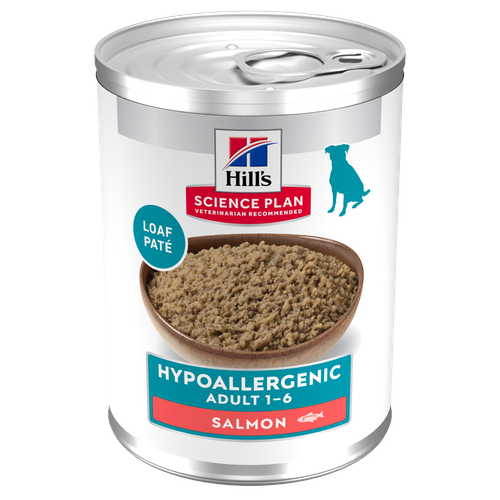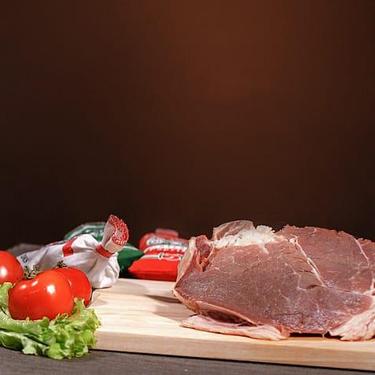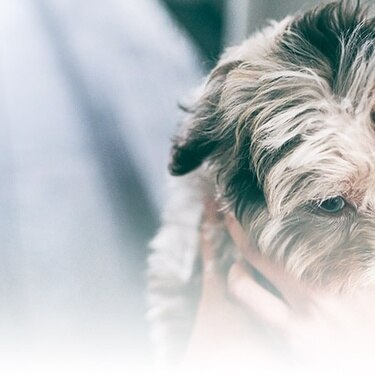
-
Find the right food for your petTake this quiz to see which food may be the best for your furry friend.Find the right food for your petTake this quiz to see which food may be the best for your furry friend.Featured products
 Mature Adult Dog Food
Mature Adult Dog FoodHill's Science Plan Mature Adult Multipack Wet Dog Food with Chicken & Beef are complete premium pet foods for mature adult dogs from 7 years. Your dog will love these deliciously smooth and savoury minced loaves, formulated to deliver the appropriate amount of energy to support the needs of adult dogs.
Shop Now Puppy Food
Puppy FoodHill's Science Plan Puppy Multipack Wet Dog Food with Chicken & Beef are complete premium pet foods for growing puppies from weaning until 1 year old and for pregnant and nursing dogs. Your puppy will love these deliciously smooth and savoury minced loaves, formulated for balanced nutrition and overall health.
Shop Now Adult Wet Dog Food with Beef
Adult Wet Dog Food with BeefHill's Science Plan Adult Multipack Wet Dog Food with Chicken, Beef & Turkey are complete premium pet foods for adult dogs from 1 year. Your dog will love these deliciously smooth and savoury minced loaves, formulated for balanced nutrition and overall health.
Shop NowFeatured products Light Adult Multipack Wet Cat Food with Chicken & Ocean Fish
Light Adult Multipack Wet Cat Food with Chicken & Ocean FishTender chicken chunks in gravy for cats, with L-carnitine and fewer calories for ideal weight management. Packed with high-quality protein, omega-6s, and vitamin E for shiny fur and healthy skin.
Shop Now Mature Adult Wet Cat Food with Chicken
Mature Adult Wet Cat Food with Chicken
Tender chicken chunks in gravy for mature adult cats. Made with easy-to-digest ingredients, high-quality protein for lean muscle maintenance and antioxidant vitamins C+E for optimal health.
Shop Now Adult Multipack Wet Cat Food with Beef, Ocean Fish & Chicken
Adult Multipack Wet Cat Food with Beef, Ocean Fish & ChickenTender chunks in gravy for cats, with high-quality protein to maintain lean muscle. With vitamin E and omega-3s & -6s for healthy skin and balanced minerals to support healthy vital organs.
Shop Now -
Dog
- Dog Tips & Articles
-
Health Category
- Weight
- Food & Environmental Sensitivities
- Urinary
- Digestive
- Joint
- Kidney
-
Life Stage
- Puppy Nutrition
- Adult Nutrition
- Senior Nutrition
Cat- Cat Tips & Articles
-
Health Category
- Weight
- Skin & Food Sensitivities
- Urinary
- Digestive
- Kidney
-
Life Stage
- Kitten Nutrition
- Adult Nutrition
Featured articles The Right Diet For Your Pet
The Right Diet For Your PetIn people, the right diet is very important. If you are eating the wrong way for your metabolism, activity level, age and lifestyle you could end up with health issues.
Read More The Incredible Science Behind Your Pet's Microbiome
The Incredible Science Behind Your Pet's MicrobiomeLearn what your pet's microbiome is, how it contributes to your pet's gut and overall health, and why nutrition is important in maintaining healthy microbiomes.
Read More Show some love with wet foods: a great choice for pets with health issues
Show some love with wet foods: a great choice for pets with health issuesShow some love with wet foods: a great choice for pets with health issues.
Read More -


Constipation is difficulty passing stools, usually because the poo has become very dry and hard for some reason. If you’ve ever been constipated yourself, you’ll know that, at best, it’s an unpleasant feeling and at worst, can make you feel bloated, ill and positively miserable. Well, the same is true for our dogs. The digestive tracts of dogs and humans are very similar, and we’re both mammals, so much of what we experience when it comes to tummy troubles will be the same for our dogs. It’s good to empathise sometimes!
In this article, we’ll look at what causes constipation in dogs, how to know if your dog is constipated and, most importantly, what you can do to help if it happens.
What causes constipation in dogs?
The most common causes of constipation in dogs are:
Dehydration.
Eating indigestible things like grass, bones or foreign bodies.
Arthritic pain in the back and hips, which makes dogs reluctant to squat.
Enlarged prostate (male dogs).
Perineal hernia (male dogs). In some dogs, especially older, uncastrated dogs, the muscles that support the rectum and hold it in place become weak. This allows the rectum to move out of place and it starts to bulge through the weakened muscles. This means that faeces get easily trapped and difficult to pass. Perineal hernias can often be seen as bulging mass under the skin on one or both sides of the anus.
Intestinal disease, neurological problems, or tumours.
Lack of exercise.
Lack of fibre in the diet.
Behavioural issues such as fear or anxiety.


Tasty Tips
What are the signs of constipation in dogs?
The colon is the last part of the intestine before the rectum. Its main job is reabsorbing water from the poo, so when your dog is constipated, the stools spend longer in the colon and get drier and firmer. It’s a bit of a vicious circle.
As you might expect, the most obvious sign of constipation is a dog that tries to go for a poo but can’t manage, or only a small amount comes out. Constipated dogs will often keep circling, or straining, frequently look at their bottom or scoot their rear end on the floor. In some cases you might see blood being passed because of all the straining, or your dog may cry in pain. Bear in mind that all these signs may also be a sign of colitis, which is an inflamed colon.
If constipation goes on for any length of time, your dog may go off their food, lose weight and seem depressed.
What can you do if you think your dog is constipated?
If you think your dog is unwell or you’ve seen signs of blood or pain, then a vet visit is in order. The same is true if your dog has been unable to pass stools for more than a couple of days.
In the early cases, the best thing to do is see if you can encourage your dog to drink plenty of water and go for some nice walks. Physical activity and exercise are great bowel stimulants, and if your dog’s constipation is mild then this may be enough to get everything moving again. If it happens again, it’s worth considering a higher-fibre food, but always ask your vet before switching diets. If your dog is underweight or very active, a high-fibre food may not be the right thing to do.
If your dog’s constipation isn’t improving with exercise and water intake, then it’s best to get to your vet to make sure there isn’t an underlying cause. Your vet will want to do a physical exam, which will include a rectal exam to make sure there isn’t a physical blockage. In some cases, X-rays may be required to check for foreign bodies like bones, or growths. In most cases, an enema, medication, or a change of diet will resolve the problem, but depending on the cause, surgery or long-term medication may also be needed.
Preventing constipation
As with all things for our pets, prevention is always better than cure. Keeping your dog slim and active throughout life is a major factor in all-round good health, including digestive health. Feeding a good-quality, complete and balanced food is also very important for preventing digestive upsets, including constipation. Make sure your dog always has plenty of fresh water available. You can soak their kibbles if you worry they don’t drink enough.
If ever you have a doubt or worry, ask your vet. We are always happy to help and it’s always better to be safe than sorry.
Reviewed by Dr. Hein Meyer, DVM, PhD, Dipl-ECVIM-CA


One of our staff authors prepared this article for you
Related products

Hill's Science Plan Adult Multipack Wet Dog Food with Chicken, Beef & Turkey are complete premium pet foods for adult dogs from 1 year. Your dog will love these deliciously smooth and savoury minced loaves, formulated for balanced nutrition and overall health.

Hill's Science Plan Puppy Multipack Wet Dog Food with Chicken & Beef are complete premium pet foods for growing puppies from weaning until 1 year old and for pregnant and nursing dogs. Your puppy will love these deliciously smooth and savoury minced loaves, formulated for balanced nutrition and overall health.

Hill's Science Plan Mature Adult Multipack Wet Dog Food with Chicken & Beef are complete premium pet foods for mature adult dogs from 7 years. Your dog will love these deliciously smooth and savoury minced loaves, formulated to deliver the appropriate amount of energy to support the needs of adult dogs.

Hill's Science Plan Hypoallergenic Adult Wet Dog Food with Salmon is a complete premium pet food for all adult dogs from 1 year. This savoury tinned loaf is specially formulated for dogs with delicate skin and stomachs. It features a single novel animal protein source and is grain-free.
Related articles

Learn about the potential health risks of a raw diet for dogs and why they aren't the best option for your pup or you.

How, when and what to feed your new puppy is an important decision, learn more about the things to consider for feeding your puppy.

Learn effective tips for feeding a dog that's a picky eater and ensure proper nutrition for a finicky eater. Discover tips for pet parents at Hill's Pet UK.

Many human foods are dangerous to dogs. Read about 5 of the worst toxic food offenders that can kill your dog - and how much it takes to hurt them.

Put your dog on a diet without them knowing
Our low calorie formula helps you control your dog's weight. It's packed with high-quality protein for building lean muscles, and made with purposeful ingredients for a flavourful, nutritious meal. Clinically proven antioxidants, Vitamin C+E, help promote a healthy immune system.
Put your dog on a diet without them knowing
Our low calorie formula helps you control your dog's weight. It's packed with high-quality protein for building lean muscles, and made with purposeful ingredients for a flavourful, nutritious meal. Clinically proven antioxidants, Vitamin C+E, help promote a healthy immune system.

